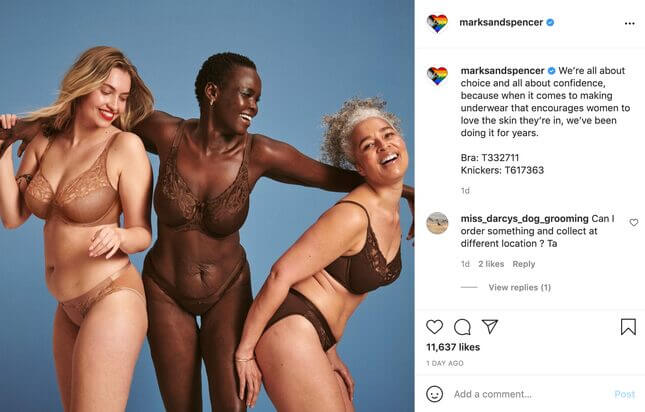The Discourse Following George Floyd's Death Inspired Marks and Spencer's Latest Launch of Nude Colored Bras
It took police brutality and a "global conversation on racial inequality" for the UK's biggest lingerie retailer to promote brown bras
BeautyStyle

Imagine David Guetta’s “shout out to George Floyd and his family” statement, but instead of a well-meaning sentiment coming from a DJ who lacks tact, it’s coming from a British retailer that sells clothes, underwear, and (very good) snacks.
Marks and Spencer has launched an “inclusive” nude underwear line more fitting for a wider range of skin tones. In other words, “nude” isn’t just synonymous with beige, but also tans and deep browns.
From Metro:
A statement explains that the retailer has been focused on ‘redefining its “neutrals” (nude) underwear’ because previously, ‘the offer at M&S was inconsistent and inadequate for all ethnicities.’
‘What the team has now created in “new neutrals” is a truly inclusive range – a selection of our customer’s favourite styles available in five great shades named Opaline, Rich Amber, Rich Quartz, Rose Quartz & Topaz.’
[…]
‘We listened when our customers and colleagues told us we hadn’t got it right when it came to colour; both in the choices available and the way we talked about the neutral shades,’ says Laura Charles, director of M&S Lingerie.
‘The global conversations around race and equality over the last 12 months spurred us to go faster in creating a better, more inclusive range.’
On the face of it, this is a harmless move to garner positive PR and boost sales from various racial and ethnic demographics. Plus, the ad campaign is a beautiful array of models of various skin tones as well as sizes and ages.
-

-

-

-

-

-

-

-

-

-

-

-

-

-

-

-

-

-

-

-

-

-

-

-

-

-

-

-

-

-

-

-

-

-

-

-

-

-

-

-








































